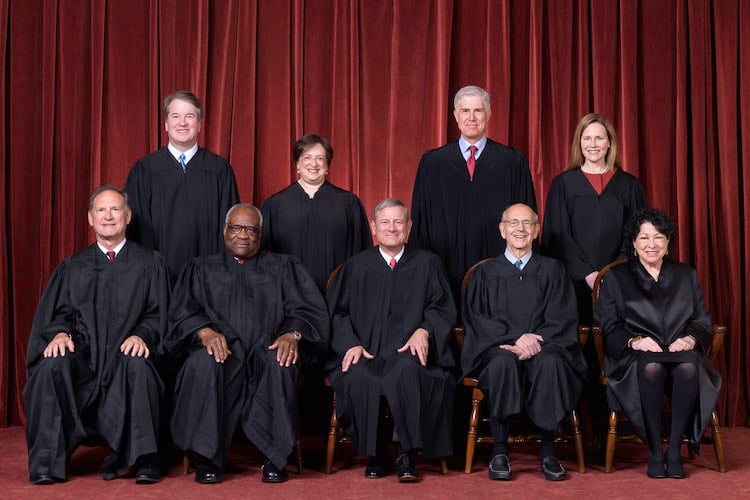
The justices of the U.S. Supreme Court sit for their official portrait, April 23, 2021.
Seated from left to right: Justices Samuel A. Alito, Jr. and Clarence Thomas, Chief Justice John G. Roberts, Jr., and Justices Stephen G. Breyer and Sonia Sotomayor. Standing from left to right: Justices Brett M. Kavanaugh, Elena Kagan, Neil M. Gorsuch, and Amy Coney Barrett. Photo: Fred Schilling, Collection of the Supreme Court of the United States.
The Supreme Court voted in favor of overturning Roe v Wade, according to a leaked draft opinion written by Justice Samuel Alito.
The document, obtained by Politico and reported earlier this month, is a version of an opinion being circulated among the justices.
The decision in the opinion is not final and could likely change shape before issued.
Martin Jenkins confirmed as first gay California Supreme Court justice
However, if the court does indeed overturn Roe v Wade, it has grave implications not only for abortion rights but for other rights rooted in privacy, such as the rights to contraception, private sexual activity, and marriage equality.
The similarities in the legal principles at the heart of both Roe v. Wade and LGBTQ+ is what is fueling concern that same-sex marriage could be the court’s next target.
“The core of LGBTQ rights draws from the same principles that are at stake when it comes to reproductive justice and freedom,” Lambda Legal attorney Sharon McGowan tells The Advocate.
Those principles, McGowan says, include the ability to make life-essential decisions without government interference and the right to autonomy and individual decision-making.
She added that decisions related to LGBTQ+ rights have always had some critics on the high court. When it once was Justice Antonin Scalia, it’s now Justices Alito and Clarence Thomas. The two have taken “an extraordinarily narrow view of the Constitution,” McGowan says.
“They have been biding their time, waiting for the composition of the lower courts and the Supreme Court to look more like their worldview than the worldview of the country as a whole and certainly those who have studied the constitution,” McGowan explains.
The two have already voiced their opposition to the marriage equality ruling.
But while these concerns are present in the minds of queer Americans, there are still realities to consider right now.
“I think that it’s important to recognize that marriage equality is still the law of the land. Access to abortion is still the law of the land,” McGowan says. “We will see what the ultimate decision of the Supreme Court looks like with respect to abortion and what it says and what it could mean for the other LGBTQ rights that are connected to those same constitutional principles.”
She explains that LGBTQ+ should care about the leak and the potential for Roe v Wade to be overturned. LGBTQ+ Americans need reproductive health care in various ways.
For those concerned with the leak and what overturning Roe v. Wade means for marriage equality, McGowan warns people not to rush into anything — like marriage, for instance.
“I would not suggest that someone run off and get married tomorrow … because there’s a whole cascade of legal obligations and responsibilities that flow from that,” she says.
However, she does tell The Advocate that people should stay informed about their legal rights.
“Stay aware of what your legal rights are. Consult with a lawyer to make sure that you are doing all the things to protect your family and not just assume that everything will be fine and you can just put your head in the sand,” McGowan recommends.
Regardless of what the final court decision is on Roe v Wade or if the court eventually takes a case that could overturn a landmark LGBTQ+ rights one, McGowan urges people to stay informed. “Everyone needs to make sure that they stay engaged and understand how important their involvement is in the political process because obviously the makeup of our courts in many ways is tied to who are the individuals nominating them to the court.”
She adds, “I said don’t panic, but you certainly better be paying attention.”
This article originally appeared on Advocate.com, and is shared here as part of an LGBTQ+ community exchange between Q Voice News and Pride Media.
